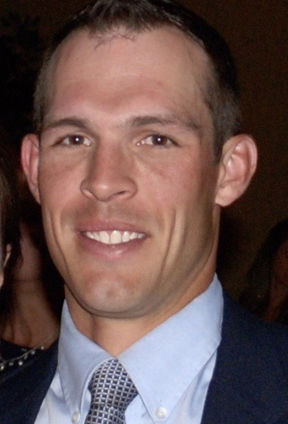Alumnus Inspires High School Students with Creative Curriculum
January 3, 2018
 Extremely popular among his students at nearby McCann Technical School, U.S. history
teacher Ken Recore ’10, M.Ed ’12 does not limit the material he presents to his ninth
and tenth grade students to mere dates and facts to memorize. Instead, to keep the
curriculum fresh, he presents it as a series of stories and themes. “It is to our
great detriment to have our students cast off history as useless knowledge,” he explained.
“There are many lessons to be learned.”
Extremely popular among his students at nearby McCann Technical School, U.S. history
teacher Ken Recore ’10, M.Ed ’12 does not limit the material he presents to his ninth
and tenth grade students to mere dates and facts to memorize. Instead, to keep the
curriculum fresh, he presents it as a series of stories and themes. “It is to our
great detriment to have our students cast off history as useless knowledge,” he explained.
“There are many lessons to be learned.”
To facilitate this learning, Recore employs a number of strategies. For example, he has his tenth grade students engage in video conferences with historians and other students from around the country. And, his ninth grade students access a website that features a series of complex, interactive games that they play, which teach them about the various branches of government.
“The games provide students with hands-on experience and instant feedback,” he said. “I like students to leave my class with a fundamental understanding of the values that our democratic system was based on, such as the embracing of differing viewpoints and sharing of power.”
Although much focus within the field of history is given to macro issues that involve countries and politics, Recore explained, a more fascinating aspect of history is found through an exploration of micro life lessons: “History translates extremely well to analogies and metaphors involving students’ experience inside and outside of the classroom. It is extremely rewarding to see students display empathy and critical thinking when they compare their own scenarios, decision making, successes, and failures, to historical events.”
As an MCLA student, Recore found that his history professors were extremely devoted to him and his success, as well as deeply invested in the content that they taught in their classes:
“These educators were equally gifted in sharing information and making connections with students,” Recore said. “They all served as role models that helped guide me through my college career. The lessons I learned about work ethic, sound communication and career selection were paramount to my success after college. I try to incorporate this ‘student first’ approach in my classroom, as well. The history curriculum is important, but equally essential is developing the whole student.”
His college experience at MCLA included an opportunity to student teach with an “incredible mentor,” who taught history at a nearby high school, and whom Recore found influential in his decision to pursue a career in education. As a result, Recore feels a great responsibility to give back to the MCLA students who student teach in his classes. All of them, he said, “have been excellent. They are willing to learn, appreciate feedback, and are generally great people.”
Recore, who came to MCLA from Averill Park, N.Y., greatly enjoyed his experience at the College. He explained, “Class sizes were small, and all of my professors were excellent at making me feel welcome. I enjoyed the ability to communicate directly with them, and felt that I was playing a key role in shaping my own education.”
